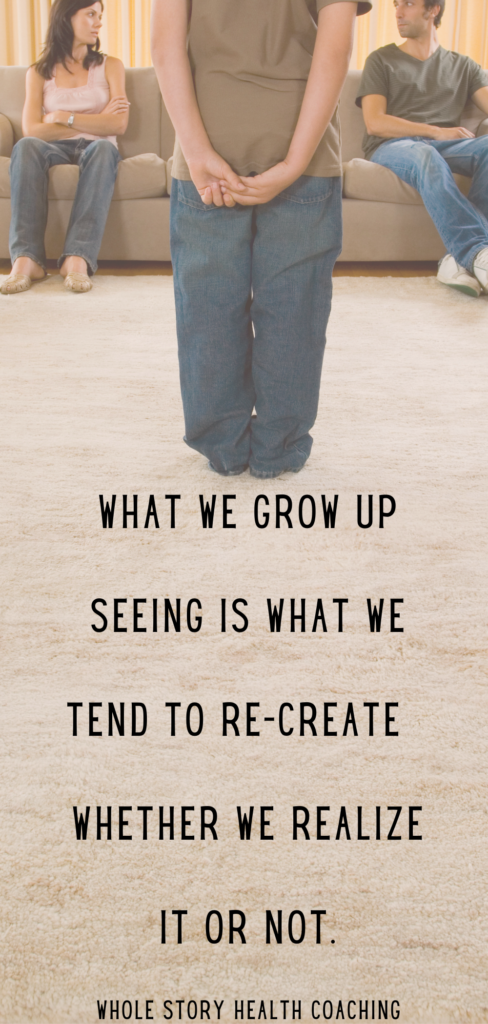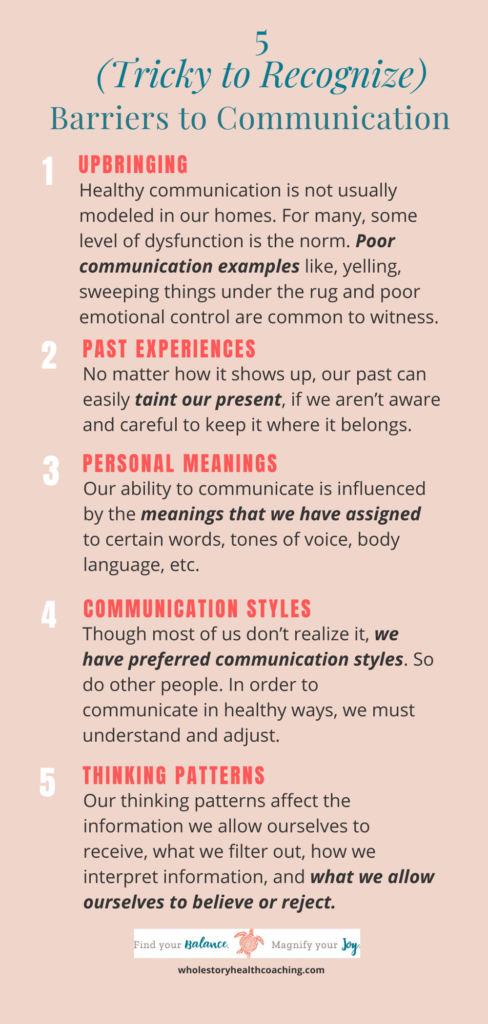Barriers to healthy, effective communication can be as varied as the people we talk to. In fact, factors that we aren’t even aware of can easily influence us and distort our perception —both what we say and hear.
I’m always amazed when someone says, “just” tell the other person how you feel.” Really? Is it that simple? In most cases, it’s not. As most of us already know, communicating isn’t always as easy as taking turns while we calmly speak and listen to each other.
Despite how easy it is to give, there are a lot of hidden assumptions in that advice. For example, that all parties have:
- possession of the ability to communicate feelings and thoughts in a healthy way
- the capacity to hear in a healthy way
- the ability to speak and hear objectively (without emotions)
- maturity
The list is endless and the factors above are not givens. In reality, they may not be present at all.
Common Communication Barriers
Imagine trying to talk to someone and having it pass through a series of barriers, with each one taking away or adding to the message. What would the end result really sound like?
Well, that’s what happens on a daily basis when we interact with other people. These unseen influences can easily change the perception of what we are trying to say… or what we interpret.
Though we don’t often realize it, each of us experience situations and people through a variety of filters. We also hear through them.
Because there are too many variables to list, I chose five. However, even on a good day, our communication can easily be blocked by many more than those listed below.

#1 Upbringing
Most of the time, it’s rare to come across someone who has not been raised in some sort of dysfunction; and sadly, healthy communication is not usually modeled in our homes.
What we grow up seeing is what we tend to re-create—whether we realize it or not. We bring those factors into a relationship and struggle to realize that the other person comes in with their own barriers to communication too.
Because of the effects of our backgrounds on how we interact with others, miscommunication and misinterpretations can easily become the norm and drive a wedge between friends, family, and partners.
# 2 Reliving of Past Experiences
Personally, I have been guilty of basing my present reactions off what someone has done to me years ago. It’s a tendency that many of us struggle with.
Understanding when this is happening takes an extraordinary level of self-awareness—it is rarely obvious.
These fight or flight responses become a type of built-in safety feature. On some level, we feel threatened and act out. The reasons are as varied as the people that experience them.
- Someone may remind us of a difficult person we once knew.
- We may become anxious in certain situations — without explanation.
- Maybe we are caught in a familiar, but subconscious, pattern.
No matter how it shows up, our past can easily taint our present. And sometimes, without help, it can be hard to keep it where it belongs.
# 3 Emotions and Personal Meanings
There are times when our barriers to communication come from the meanings that we have assigned to certain words, tones of voice, body language, etc. For that reason, it is important to understand the impacts of the meanings we cling to.
When meanings combine with emotions and elements from the past, we can easily read into what is happening.
Instead of experiencing the reality of the circumstances — our interpretation of what is happening becomes distorted.
Unfortunately, because we tend to act on our thoughts, we can end up reacting to our not-so-accurate assessments. This not only confuses people, but can also push them away.
# 4 Communication Styles
Communication involves a great deal of understanding and the willingness to compromise. And though most of us don’t realize it, we have preferred communication styles. So do others. Sometimes, that’s a hard pill to swallow.
For example, I used to struggle with understanding that some people take their time before responding or need space to process their emotions and thoughts before they speak.
Since I like ongoing , in the moment communication, anything outside of that provoked my anxiety —especially when silence was involved. I had to learn to be patient.
My transformation from rigid communicator to being more accepting of others was not an easy or quick process. It has taken:
- quite a bit of effort
- the ability to suspend my ego
- a willingness to meet people where they are
Rather than insist on someone communicating in the way we want them to, we have to be willing to hear them despite the differences.
# 5 Thinking Patterns
Sometimes, the way we normally think doesn’t (and can’t) provide the clarity we need.
These thinking patterns also affect:
- the information we allow ourselves to receive
- what we filter out
- how we interpret information
- what we allow ourselves to believe or reject
Recently, I overheard a woman say to her husband, “I thought I was annoying you.” I had no idea of knowing if that were true or not, but she clearly stated it was something that she was thinking.
Once she understood that he was not annoyed, she then went on to talk about whatever was on her mind.
While that incident didn’t cause any major damage, when we exist in these patterns, we can easily destroy our friendships and relationships. We can also have negative repercussions in our work environments.
How often do we make decisions or alter our communication with someone based on what we think they’re thinking, or will think…instead of clarifying?
Char Aukland
Hopefully, you’ve noticed how each of these barriers work together. But just in case, here’s just one example of how they have combined in my own life.
My upbringing has affected the way I view silence. So, when someone takes too long (my meaning) to respond, I start to overthink the reasons (projection of past and thinking patterns). My old response would be either to shut down my own communication or go into overdrive trying to force a conversation (communication styles).
The reasons that we’ve gone over above are just a few of the factors that play into why someone would choose to avoid rather than confront an issue.
Each of us have our own variations of communication barriers. Which of these undermining obstacles have you faced?



